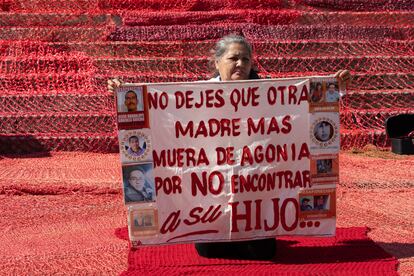A child buried underground: mothers conquer the political arena in Mexico
Candidates for political office can no longer sideline or neglect the women who are looking for their missing loved ones


The mothers who search for their children in Mexico are the equivalent of Argentina’s Mothers of the Plaza de Mayo these days. They’ve gained relevance as they’ve been digging through the earth with their hands.
There are thousands of disappeared people in the country, which is dominated by drug traffickers. The painful circumstances of their loved ones — particularly their mothers — has generated international interest. The tenacity and tears of these iron women has kept the cause alive, against all odds. They beg the government — be it this one or the next — for pickaxes, shovels and protection. Sometimes, they add their own corpses to the enormous Mexican cemetery.
This past Sunday, the biggest political event in the country was the official recognition of the opposition candidate who will contest the presidency in 2024. Senator Xóchitl Gálvez held a rally with thousands of her supporters at the most emblematic roundabout in the capital: the Angel of Independence. However, the presidential candidate had her fellow politicians stay a few feet away from her — she preferred to keep Cecilia Flores close.
Flores has been looking for her two missing children for eight years. Her tragedy is enough to illustrate the hardships that countless mothers go through in Mexico. One day, when a hitman pointed a gun at her head and ordered her to kneel, Flores looked into his eyes: “If you’re going to kill me, shoot me in the face and think of your mother, because the day you disappear, she will be the one looking for you, just as I look for my children.” While on stage beside Senator Gálvez, Flores wore her usual shirt, which is emblazoned with photographs of Alejandro and Marco Antonio, her missing sons. She is now on the political frontlines.
The political space that these women have conquered and the interest that their cause arouses are measured by their presence in the public sphere. They are standing together with the brand new opposition candidate. Two weeks ago, their criticism of the government’s search process pushed Karla Quintana, the head of the National Search Commission, to resign, due to discrepancies between her and the Mexican president. The authorities calculate that, every day, some 27 people don’t return home in Mexico, while the census counts some 100,000 whose whereabouts are unknown.
Searching mothers have had the wisdom to join the media in a fight that requires their voice. Their activism has also conquered cinema and literature, with successful films and books detailing their frantic pilgrimage through offices, mountains, ditches, deserts and garbage dumps. Even the Barbie phenomenon has touched their efforts — a “searcher” Barbie was designed, to make the campaign more visible and generate support from the public. But the most political gesture of recent times has been, without a doubt, the negotiation that some of these mothers have initiated with the drug traffickers, so that they can be allowed to search mass graves without the risk of being murdered in narco-controlled territory. In the Mexican states of Tamaulipas, Sonora and Sinaloa, the women asked the drug traffickers for a truce, so that they could dig through the earth. To some extent, they succeeded in these discussions.
Mexican political life is already tied to the searching mothers — one of the great causes and embarrassments in the country. The incumbent government has had achievements in this field, as finding the disappeared was one of the commitments made by President Andrés Manuel López Obrador when he sought the presidency in 2018. The Ayotzinapa case (the 43 students who disappeared in 2014) — despite the setbacks and obstacles throughout the investigations — has reported progress, to give just one example. Quintana’s resignation, however, has damaged one of the political projects that citizens could identify with. Consequently, the government is ceding ground to the opposition, which is learning how to take advantage of it.
The mothers aren’t going to rest, in Mexico, Argentina, or anywhere else. Politicians are quickly realizing this. The fact that many of the disappeared are underground is a truth that no one can escape from — that’s why the women use picks and shovels and their nails to dig through clandestine graves. As Flores summarizes: “I want to see my children again, even if they’re just a handful of bones.”
Sign up for our weekly newsletter to get more English-language news coverage from EL PAÍS USA Edition
Tu suscripción se está usando en otro dispositivo
¿Quieres añadir otro usuario a tu suscripción?
Si continúas leyendo en este dispositivo, no se podrá leer en el otro.
FlechaTu suscripción se está usando en otro dispositivo y solo puedes acceder a EL PAÍS desde un dispositivo a la vez.
Si quieres compartir tu cuenta, cambia tu suscripción a la modalidad Premium, así podrás añadir otro usuario. Cada uno accederá con su propia cuenta de email, lo que os permitirá personalizar vuestra experiencia en EL PAÍS.
¿Tienes una suscripción de empresa? Accede aquí para contratar más cuentas.
En el caso de no saber quién está usando tu cuenta, te recomendamos cambiar tu contraseña aquí.
Si decides continuar compartiendo tu cuenta, este mensaje se mostrará en tu dispositivo y en el de la otra persona que está usando tu cuenta de forma indefinida, afectando a tu experiencia de lectura. Puedes consultar aquí los términos y condiciones de la suscripción digital.








































